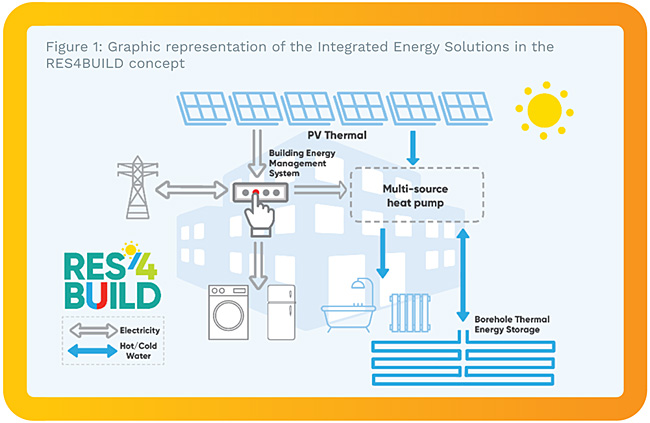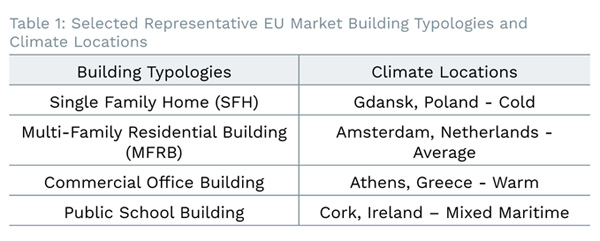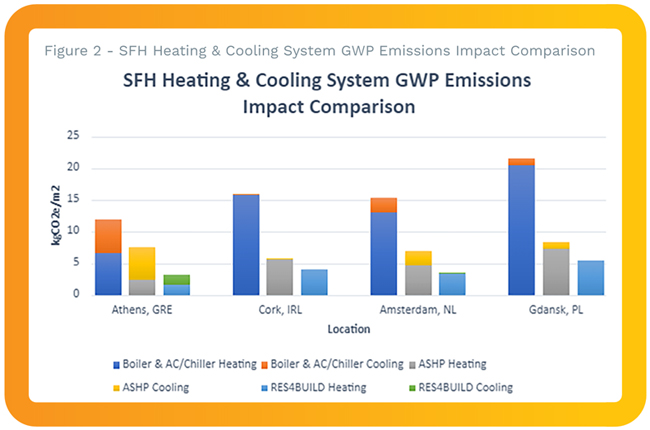Detailed assessment of the carbon savings possible today by applying smart combinations of exiting solutions in the European building stock
Never has it been more important to ensure that Europeans can cover the energy needs of their buildings in an affordable and environmentally friendly way. Climate change acceleration, geopolitical challenges and the energy crisis make the three traditional pillars of European energy policy as relevant as ever: (i) security of supply, (ii) competitiveness, (iii) sustainability.
The RES4BUILD project started in 2019 with the aim to decarbonise the energy consumption in buildings by developing integrated renewable-energy-based solutions. Using onsite renewable energy with decarbonised grid electricity, the RES4BUILD integrated energy system (shown in Fig.1) incorporates heat pump and combined Solar Photovoltaic-Thermal (PV/T) technologies with thermal energy storage and smart Building Energy Management System (BEMS) to produce low to zero carbon heating and cooling for buildings. This work is particularly relevant today, because while decarbonisation has been the main objective, decoupling from fossil fuels contributes to security of supply, while using on-site generated electricity contributes to affordability and decouples the heating/cooling costs from heavily fluctuating market prices.

The project has achieved remarkable progress, developing and integrating innovative technologies which are showcased now in pilot systems in Greece, Denmark and Belgium. This article focuses on the work performed to assesses the potential impact of this RES4BUILD integrated energy system from a decarbonisation point of view.
European Market Research
The RES4BUILD integrated renewable energy system is designed to be tailored to the needs and requirements of the users. These users are generally defined by the building typology which reflects their function and general form. Additionally, location and energy performance of such building typologies affects the RES4BUILD system design, therefore the building typologies, climate and energy performance data is collected for typical EU buildings.
Fortunately, there has been extensive research on building typologies and energy performance for Europe which we have utilised to produce the RES4BUILD blueprint of the EU building stock. Existing data bases, such as Eurostat, EU Building Stock Observatory and BPIE, were used for the initial data mining, with additional relevant research projects such as ENTRANZE, EPISCOPE – TABULA and STRATEGO reviewed to develop learnings further.
In carrying out this research, it was decided to represent the EU building market by 4 building typologies and 4 climate zones as shown in Table 1. The chosen building typologies characterise approx. 86% of the total EU building stock floor area. Three locations representative of the EU climates as set out in EN14825, with an additional location (Cork, Ireland) to represent the cooler, maritime European climate. These 4 climatic regions how unique characteristics particularly in terms of peak heating and cooling requirement. The minimum energy performance required of the buildings is chosen from the local member state's national renovation plan as required to achieve EU 2050 decarbonisation goals.

Advanced Building Energy Modelling
The 4 selected building typologies in the 4 chosen locations were modelled employing generalised simulation techniques, using the EU market research data and selected typologies. Typical building energy demand profiles were produced by Arup using a scripted open system energy modelling methodology utilising a combination of the widely available Rhino and Grasshopper software tools, operating with several open-source 'plug-ins' such as Honeybee, Open Studio and IronBug. Project partner NSCRD used test-bed, real-time, system energy simulations to model the RES4BUILD system operation and energy consumption. Based on these consumption profiles, our project partner, VITO, reviewed and optimised thermal energy demand with energy supply profiles using 'smart-buildings' control algorithms.

RES4BUILD Impact assessment
The impacts on fossil fuel reduction and environmental impact of the RES4BUILD integrated energy system is calculated for the EU market for each building type and climatic location.
Comparing the RES4BUILD system to a baseline gas-fired boiler (for heating) and electrically powered chiller (for cooling) scenario, and an alternative simple Air Source Heat Pump (ASHP) scenario, the environmental and decarbonisation benefits of the RES4BUILD system are shown.
Applying these building and location specific results across the EU market, the potential impact of implementing the RES4BUILD system on European fossil fuel usage and CO2e reduction is estimated to lead to a possible reduction of 75%.
The potential for a major reduction in building energy related CO2 emissions is considerable but further research on the local market idiosyncrasies and regulatory drivers / barriers are required, along with the cost and social impacts of adopting these technological solutions.
Optimal business models
The study indicates the technical potential of integrated energy systems in the European market, however the actual impact depends on the actual reach to building owners, tenants and investors. Therefore this impact study is a prelude to the wider market analysis, which is currently ongoing. This maps out the influencing policies, cultural, socio-economic and energy network aspects in various EU-countries. This will indicate the actual applicability of this approach and provides input for optimal business models to serve these end-users in their transition to decarbonisation
The RES4BUILD project has received funding from the European Union's Horizon 2020 research and innovation programme under Grant Agreement No. 814865 (RES4BUILD). This output reflects only the author's view. The European Climate, Infrastructure and Environment Executive Agency (CINEA) and the European Commission cannot be held responsible for any use that may be made of the information contained therein.